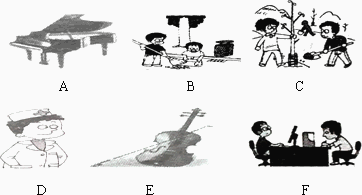

题目列表(包括答案和解析)
[ ]
[ ]
[ ]
[ ]
[ ]
[ ]
[ ]
[ ]
[ ]
[ ]
Do you think your schoolwork is too hard? Do you feel you have too much homework? If you answer “yes”, you are in the same boat as most US kids. However, school life for them is about to get even harder.
A group of 13 states have decided to make their schools’ workload(工作量) much heavier, especially in math and English. Most students in US high schools work very hard. But it is not like in China, where almost all students have to work from early morning till late in the evening.
US students have a lot of freedom to decide how hard they should work. “Most students put in a lot of effort (努力), but some do almost nothing,” said Will Gordon, a teacher from North Carolina. “I think stricter rules will help those students who aren’t so focused (集中精神的).”
“For the most part, it’s good,” said Adam Jorve, 15, a student at Gordon’s school. “A lot of kids in public schools can hardly read when they graduate. However, for me, I wish I didn’t have the extra work.”
81. From the first passage we know that most US kids _______.
A. have a pleasant school life B. often go boating together
C. have hard schoolwork D. pay little attention to their schoolwork
82. Compared with Chinese students, kids in the US ________.
A. have a much heavier workload B. don’t have to work from morning till night
C. spend more time on math and English D. have no time to relax themselves
83. What freedom do US students have? They have the freedom to decide _________.
A. how hard they should work B. how long they stay at school
C. what to do and how to do it D. how much time they should spend on their work
84. ![]() In Will Gordon’s opinion, students who almost do nothing in school will be helped ______.
In Will Gordon’s opinion, students who almost do nothing in school will be helped ______.
A. by strict teachers B. by their parents
C. through the strict management (管理) D. through stricter rules
85. The passage tells us mainly about _______.
A. the heavy load of Chinese students B. the heavy load of the US students
C. the freedom of the US students D. the different school life of the US students
| |||||||||||||||||||||||||||||||||||||||||||||||||||||||||||||||||||||||||
听力(30分)
Ⅰ.听句子,选择正确的图片。(每小题1分,共5分)

1.________ 2.________ 3.________ 4.________ 5.________
Ⅱ.听句子,选择恰当的答语。(每小题1分,共5分)
6.A.Thank you.
B.Of course not.
C.That's all right.
7.A.Turn off, and you’ll see it on your right.
B.It is very comfortable.
C.Don’t ask me.
8.A.It sounds beautiful.
B.No, I don’t.
C.Yes, I’d love to.
9.A.I like your hair.
B.My hair is black.
C.Yes, I did.
10.A.Because I like you.
B.I like watching TV.
C.Because it’s not a good idea.
Ⅲ.听对话,选择正确答案。(每小题1分,共10分)
听第一段对话,完成第11小题
11.Whom did Kate get her bag from?
A.Her parents.
B.Her uncle.
C.Her friend.
听第二段对话,完成第12小题
12.When will the plane take off?
A.At 10∶05.
B.At 10∶20.
C.At 10∶35
听第三段对话,完成第13小题
13.Where was Simon born?
A.In America.
B.In Australia.
C.In England.
听第四段对话,完成第14-15小题
14.Where are they probably?
A.In a classroom.
B.In a shop.
C.In a hospital.
15.How long has the man been like this?
A.For one day.
B.For two days.
C.For three days.
听第五段对话,完成第16-17小题
16.Who is collecting waste paper?
A.The girl.
B.Lin Tao.
C.Kangkang.
17.What is the advantage of collecting waste paper?
A.Protecting our environment.
B.Raising money.
C.Both A and B.
听第六段对话,完成第18-20小题
18.What does the boy want to know?
A.Chinese culture.
B.Chinese food.
C.Chinese students’ school life.
19.What do the Chinese students do on the morning of the school days?
A.They read Chinese or English.
B.They listen to the English tapes.
C.They do their homework.
20.What will they do after the talk?
A.They will learn English hard.
B.They will learn Chinese hard.
C.They will help each other in language learning.
Ⅳ.听短文,选择最佳答案。(每小题1分,共5分)
21.Life today has ________.
A.many problems.
B.few problems.
C.no problem.
22.One of the biggest problems today is ________.
A.population
B.pollution
C.education.
23.________ is the most serious kind of pollution.
A.Noise pollution.
B.Air pollution.
C.Water pollution.
24.The speaker mentions(提到)________ rules to fight pollution.
A.four.
B.five.
C.six.
25.________ makes us become angry more easily.
A.Air pollution.
B.Water pollution.
C.Noise pollution.
Ⅴ.听短文,完成下面表格。每空一词。(每小题1分,共5分)

湖北省互联网违法和不良信息举报平台 | 网上有害信息举报专区 | 电信诈骗举报专区 | 涉历史虚无主义有害信息举报专区 | 涉企侵权举报专区
违法和不良信息举报电话:027-86699610 举报邮箱:58377363@163.com